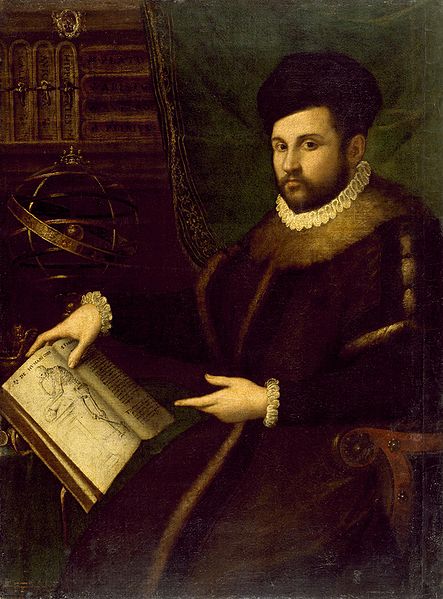<Back to Index>
- Philologist and Physician Geronimo Mercuriali, 1530
- Poet Jalāl ad-Dīn Muḥammad Rūmī, 1207
- Mexican Revolutionary José María Teclo Morelos y Pavón, 1765
PAGE SPONSOR

Geronimo (or Girolamo) Mercuriali (or Mercuriale; also known by his Latin name of Hieronymus Mercurialis) (September 30, 1530 - November 13, 1606) was an Italian philologist and physician, most famous for his work De Arte Gymnastica.
Born in the city of Forlì, the son of Giovanni Mercuriali, also a doctor, he was educated at Bologna, Padua and Venice, where he received his doctorate in 1555. Settling in his natal city, he was sent on a political mission to Rome. The pope at the time was Paul IV. In Rome, he made favorable contacts and had free access to the great libraries, where with sweeping enthusiasm, he studied the classical and medical literature of the Greeks and Romans. His studies of the attitudes of the ancients toward diet, exercise and hygiene and the use of natural methods for the cure of disease culminated in the publication of his De Arte Gymnastica (Venice, 1569). With its explanations concerning the principles of physical therapy, it is considered the first book on sports medicine.
The work gave Mercuriali fame. He was called to occupy the chair of practical medicine in Padua in 1569. During this time, he translated the works of Hippocrates, and, armed with this knowledge, wrote De morbis cutaneis (1572), considered the first scientific tractation “On the diseases of the skin”; De morbis mulieribus (“On the diseases of women”) (1582); De morbis puerorum (“On the diseases of children”) (1583); De oculorum et aurium affectibus; and "Censura e dispositio operum Hippocratis" (Venice, 1583). In De morbis puerorum, Mercuriali observed contemporary trends in child rearing. He wrote that women generally finished breastfeeding an infant exclusively after the third month and entirely after around thirteen months.
In 1573, he was called to Vienna to treat the Holy Roman Emperor, Maximilian II. The emperor, pleased with Mercuriali’s treatment (although Maximilian would die three years later), made him Count Palatine.
He returned home in the following year; in 1575, the Venetian Senate awarded him a six year contract as a professor at the University of Padua. Although he was largely hailed as a hero of the city, his reputation would take a sharp turn downwards after his inept handling of the outbreak of plague in Venice in 1576 - 1577. Mercuriali was summoned by the Venetian government to head a team of medical professionals who would advise about the disease. Arguing against the quarantining and use of lazarettos by the Board of Health, Mercuriali maintained that the disease infecting Venice could not possibly be plague. He and another medical professor, Girolamo Capodivacca, offered to personally treat the sick in Venice on the condition that the quarantines and other precautions put in place by the Board of Health be lifted. The professors and their assistants traveled freely between infected and safe houses, administering treatment, to the horror of the Board of Health and officials in Padua and surrounding cities, who worried the disease would spread. When Mercuriali and Capodivacca began their treatment of the sick in Venice, the death toll had come to a near halt — this was one of the reasons they believed it could not be the true plague. However, by the end of June, the month when they began their work, it rose at an incredible rate. By the beginning of July, the Senate ordered Mercuriali and Capodivacca to be quarantined themselves and it was largely believed that their questionable methods were at fault for the spread of the plague, which eventually claimed 50,000 Venetians.
However, Mercuriali salvaged his own reputation in the following years with the 1577 publication of De Pestilentia, his treatise about the plague, which had been delivered as a series of lectures at the University of Padua.
Mercuriali was a prolific writer, though many books were ascribed to him that were compiled from the works of others. He remained in Padua until 1587, when he began teaching at the University of Bologna. In 1593, he was called by Cosimo de' Medici, the Grand Duke of Tuscany, to Pisa. Cosimo wanted to increase the prestige of the university there and offered a record salary of 1,800 gold crowns, to become 2,000 gold crowns after the second year.
Mercuriali returned to Forlì in 1606 and died there few months later.
Among his many disciples, we have to remember the Swiss botanist Gaspard Bauhin.
"March 11, 2009: The Olympic Museum in Lausanne hosted a colloquium given by the Faculty of Medicine of the University of Geneva commemorating the 400th anniversary of the death of Gerolamo Mercuriale, a precursor of sport medicine".